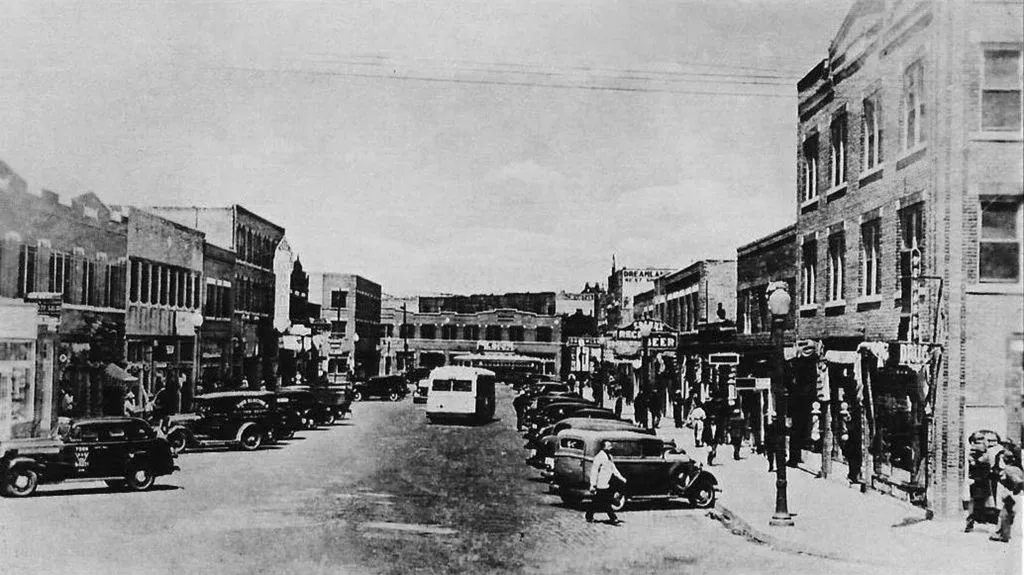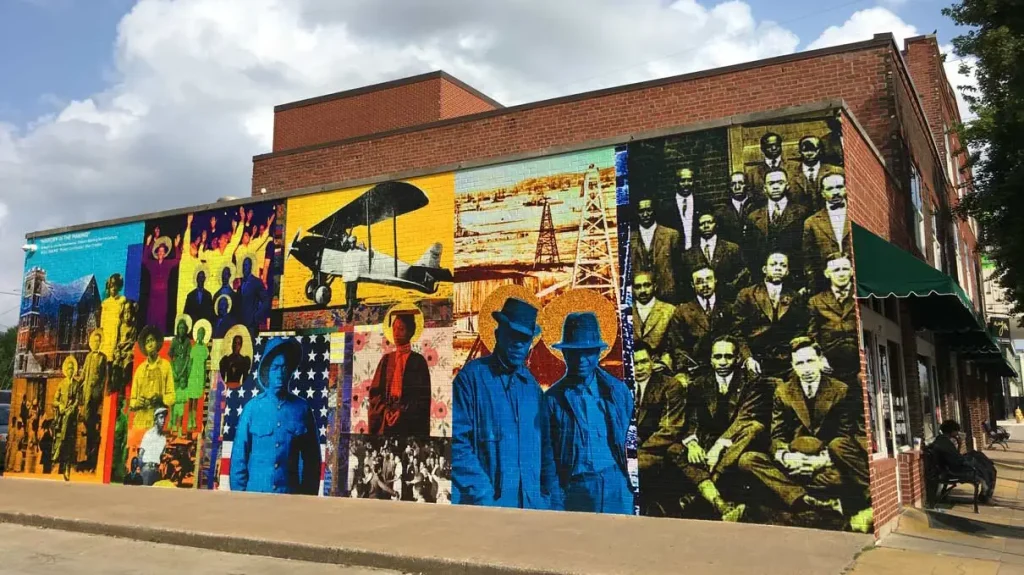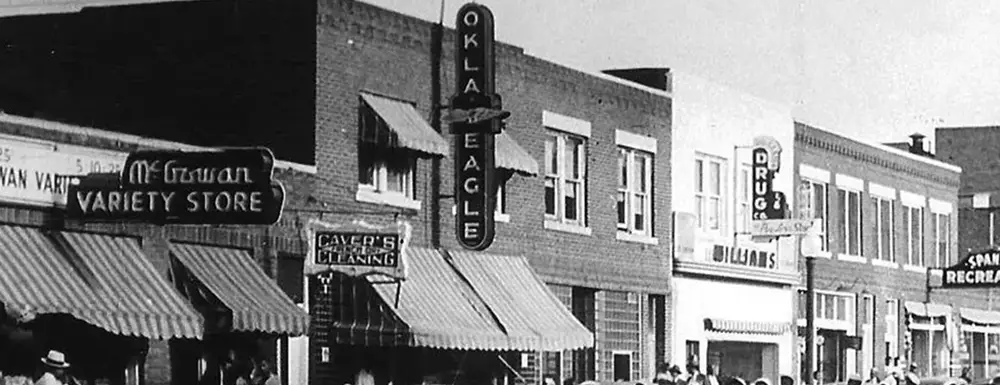With Black History Month here, let’s take a look at the profound history and enduring impact of Tulsa, Oklahoma’s Greenwood District. Often heralded as “Black Wall Street,” Greenwood was a beacon of African American prosperity and entrepreneurship in the early 20th century, complete with a thriving economy bolstered by a tight-knit community of Black business owners, professionals, and educators.
While Greenwood isn’t the same today, its legacy can continue to inspire us in many ways. We can find inspiration in the resilience, economic empowerment, and community support that was fostered in Greenwood, even in the face of systemic challenges and racial injustice.
By exploring the past, we can not only honor it — but also seek out new ways to support and grow Black-owned businesses in our current economic landscape, ensuring the crucial contributions of these Black entrepreneurs are recognized and celebrated this month and every day of the year.
Honoring Black American History and Black Wall Street

Black business owners in the Greenwood district ran everything from hotels to doctor’s offices and movie theaters. Entrepreneur O.W. Gurley is said to have founded Greenwood and its business success. He was a serial entrepreneur who owned a large area of land — and sold it to other Black businesspeople like hotelier J.B. Stradford and A.J. Smitherman, who founded the Tulsa Star newspaper.
The money spent in these small businesses went back to the Black community, as Greenwood flourished before the massacre of 1921, in which white supremacists burned down the community. Following the race massacre, these entrepreneurs and business owners faced another monumental injustice: Insurers wouldn’t pay them for the losses of their businesses. According to history.com, many Black residents left Tulsa and never returned to the area. However, some stayed and started their businesses following the racial violence, a true testament to the power of resilience.
Finding Entrepreneurial Spirit Among Inequity

Looking back at Black Wall Street and all that was accomplished is a reminder of human strength and the entrepreneurial spirit of Black business owners. Some business lessons that we can carry into today include:
1. Economic Empowerment
The entrepreneurs of Black Wall Street fought social injustices like segregation and were able to start and run successful businesses — even when they didn’t have access to the same financial institutions as white people.
Today, we can collectively support Black entrepreneurs and Black-owned businesses. In fact, the U.S. Census Bureau shows 2.5 million Black-owned businesses in operation throughout the U.S. Consider supporting Black-owned businesses in your community by shopping at their stores.
If you have a positive shopping or dining experience, you can also write reviews on Yelp, Google, or other platforms to support the efforts of these businesses. Additionally, if you’re already a business owner, you can partner with Black-owned businesses in your area. Perhaps you own a coffee shop and know of a Black-owned art business down the street, you could form a partnership to offer their art in your coffee shop. The options are endless for providing support, a crucial part of closing the racial wealth gap, fostering more job opportunities, and holding other companies accountable, according to greenamerica.org.
If you’re looking for a list of top Black-owned companies, Forbes has compiled one for you. From finance brands and beauty companies to restaurants and media companies, there are many successful Black-owned companies thriving all over the country today.
Explore the stories of five Black Business Owners Making Waves in their communities, starting businesses like an eco-friendly jewelry line, toys for children in hospitals, a bookstore, and a training and development firm.
2. Resilience
In the wake of racial injustice, Black Wall Street’s business owners continued to be resilient and self-reliant in order to succeed. All entrepreneurs can learn from this lesson in adapting to change and recovering from setbacks. Chances are good that something will knock you down when you’re starting or running a company, but resilience helps you stand back up and try again.
According to a Harvard Business Review article, “Resilient people possess three characteristics — a staunch acceptance of reality; a deep belief, often buttressed by strongly held values, that life is meaningful; and an uncanny ability to improvise.” The article also notes ways to help build resilience in yourself and your employees, such as:
- Treat both setbacks and successes as positive.
- Fight back (appropriately).
- Find a new meaningful mission in your life.
3. Community Support
The Black Wall Street community thrived in part due to the community members helping and supporting one another. They used Black-owned banks to start new businesses like Black-owned doctor’s offices and schools. The money that was spent in these establishments was then turned around and put back into the businesses — ensuring a community that fosters collaboration and gives back.
Whether you own a small business or are thinking about opening one, make sure to introduce yourself and your business in your community. Form partnerships when you can, offering joint events when feasible. Putting money back into your community will help you all feel a sense of belonging, create positive social change, and leave a legacy — just like the Greenwood district, or Black Wall Street, did.
Discover the Top 10 Best Black Entrepreneur Grants and Resources today.
Providing Support as We Look to the Future
Black entrepreneurship is strong today, just like it was in the days of Greenwood and Black Wall Street in Tulsa, Oklahoma. We can continue to support Black business owners to help them build communities that give back and create new jobs and opportunities to help close the race gap. Even though Black business owners have faced systemic barriers for over a century, they’ve also made a huge impact in their communities and industries as well as the American economy as a whole — all while facing challenges and systemic barriers throughout their journeys.
If you’re looking for funding for a business venture to build your community and economy, pre-qualify with Guidant Financial today.

“I knew that I needed a funding partner that would be a reflection of the community we are trying to serve — and that is really where Guidant shines.”
— Daniella Cornue, Le Village Cowork
Read the stories of REAL small business owners who work with Guidant.



















